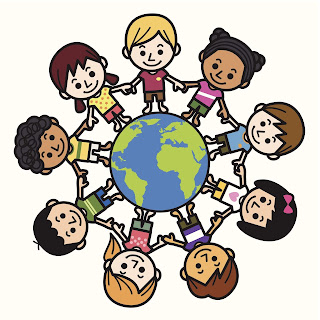Youth Work Is...Identity
"Locating Yourself for Your Students"
I thought that this article was very powerful and inspiring because it showed how important expressing your race and identity can be. Both of the professors talked about times where they looked at themselves and questioned their identity because they were the only person who was white in the room. It is an interesting and eye opening experiance to be the minority in the room when you are used to being in the majority. Starting off with you who are and your race right from the beginning of a conversation is an important aspect in getting to know someone. It was very interesting to see how the children reacted when the professors first walked into the room. After the professors introduced themselves it was crazy how their mood and mannerisms changed towards them. It's okay for people to be different from one another. These students came from different backgrounds and cultures but they were still able to appreciate the professors and the knowledge that they brought with them. I believe that it's extremely valuable for teachers to acknowledge their ethnicity with their students just like what Shirley and Priya did. When someone who is in a higher position than the students shares, it helps start the conversation. After doing this, their students felt more comfortable in their classroom community and the willingness to share out.
"When an educator's witness is unnamed, it remains in a dominant position, reinforcing that it is the noncolor color by which all other colors are measured."
This quote stood out to me because it truly showed how identity is seen in our school systems today. I think it would be very beneficial for a teacher to identify their ethnicity because they will get successful outcomes with their students. By doing this, they will develop close connections with their class. In addition, their students won't feel threatened or uncomfortable because no one will have the dominant role. A personal story I have is when I interned in a school where the teacher and I was the only people who were white. When I went in the room to introduce myself I felt the same way the students in the reading did. I instantly felt invisible because I thought they were looking at my ethnicity and judging me because of it. I wish that I read this reading before, because I could have introduced myself by stating my ethnicity firsthand and I think the outcome would have been better. This reading taught me valuable lessons that I will carry over into my current and future work as an educator. Being more aware of race and enthnicity helps you to know the people you are working with better, and can improve communication and connection.
"Why English Class is Silencing Students of Color" TED TalkMany things stood out to me after watching Jamila Lyiscott express how she felt toward identity and ethnicity among students. I thought it was interesting when she expressed her story about being on a panel, and a women stood up and said she was articulate. I was offended by the word choice that this women picked. Why did she choose that word in the first place? The implication of that statement, is that people of her ethnicity are not typically well spoken, so this was a racist comment to make, even if it wasn't intended that way. Was she stereotyping her based on her ethnicity? Hearing this made me mad inside. I couldn't imagine how she felt after hearing that comment. Jamila expressed that the women meant it as a compliment, however she was still offended. Her compliment came across wrong and offensive.
A line that stood out to me was, "if this women heard me speaking with my family whose Trinidadian and Caribbean creolized English would she have determined something else about my intellectual capacity or if she heard me speaking with my friends in Crown Heights Brooklyn in African American English would she have determined something different about my worth, and in that moment I understood that the answer was yes."
This quote shows how important words are and how it can affect another persons feelings. In particular, the women tried to give a compliment but instead it was received as offensive. It's so upsetting to know that people judge based on another's identity and ethnicity.
Another aspect of this Ted talk that I thought was important to know and understand is the paradigm principles. "Paradigms are maps where we can approximate reality." The paradigms are awareness, agency & access, actualization, achievement, and alteration & action.
With these five paradigms students are learning to navigate and understand who they are. They are also understanding who they are within their community and what their skills are.
 |





Thanks for this thoughtful and thorough reflection!
ReplyDelete